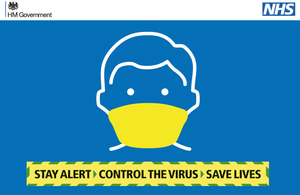Face coverings to become mandatory on public transport
From 15 June, face coverings will be required while using public transport in England.

Face covering.
- government asks transport operators in England to make wearing face coverings a requirement of using public transport from 15 June to coincide with the next stage of carefully easing restrictions
- bus, coach, train, tram, ferry and aircraft passengers must wear a face covering on their journey to help reduce the risk of transmission when social distancing is not always possible - with government also working with operators to ensure staff are provided with face coverings where appropriate
- guidance remains to work from home if you can and avoid public transport where possible
The government will work with operators to make it mandatory for passengers to wear face coverings when using public transport in England, the Transport Secretary Grant Shapps announced today (4 June 2020).
Wherever possible people should continue to avoid public transport and walk, cycle or drive, but for some people this may not be an option. Transport usage has been slowly increasing, including on the tube which has seen around a 20% rise this week compared to last week.
When necessary to use public transport people may be more likely to be in enclosed spaces for longer periods of time where we know there is a greater risk of the spread of the virus and social distancing is likely to be difficult to follow consistently. This differs from enclosed spaces like shops, for example, where people can more easily go outside if social distancing is not possible and where shop owners can place limits on the number of customers allowed inside at any one time. The Scientific Advisory Group for Emergencies (SAGE) has set out that using face coverings in this setting can provide some small additional protection to fellow passengers and can help people to avoid unknowingly spreading the virus if they are suffering from coronavirus, but not showing symptoms.
Speaking at the Downing Street coronavirus briefing, Grant Shapps confirmed the government is asking operators to introduce face coverings as a requirement for travel from 15 June 2020. The government will also work closely with the transport industry to help them implement the plans.
The changes will be made under legislation such as the National Rail Conditions of Travel and Public Service Vehicle Regulations for buses. While the government expects the vast majority of people to comply with the changes, operators will be able to refuse travel or issue penalty fines for those who fail to wear a face covering, in a similar way to the rules on having a ticket for travel. British Transport Police will also support the implementation of these changes.
Social distancing and hand washing remain by far the most important disease prevention measures but it is also vital all passengers travelling on buses, coaches, trains, trams, ferries and aircraft should wear a face covering and the government will also work with operators to ensure staff are provided with, and wear face coverings, where appropriate for their role.
People should wash their hands or use hand sanitiser before putting their face covering on and after taking it off and it is important that people don’t touch their face covering when wearing it, where possible, to avoid hand to mask transmission of the virus.
Transport Secretary Grant Shapps said:
People should continue to avoid public transport wherever possible. But, as restrictions are carefully eased when it is safe to do so, it’s likely that we will see more people needing to use public transport.
So, while respecting social distancing and maintaining good hand hygiene remain the most important steps we can all take to stay safe, wearing a face covering can play a role in helping us to protect each other.
This is about the small changes we can take to help control the virus, which is why I urge everyone using transport to wear a face covering, to help keep us all safer.
Face coverings are not the same as face masks. It is important that people do not use medical grade PPE masks to ensure these remain available for frontline staff. Last month, the government set out advice for people on how to make their own face coverings easily at home, using scarves or other textile items. These face coverings should cover the mouth and nose while allowing the wearer to breathe comfortably and can be as simple as a scarf or bandana that ties behind the head to give a snug fit.
Paul Plummer, Chief Executive of the Rail Delivery Group, said:
Wearing face coverings on trains will help to ensure that those who need to travel by rail can do so with confidence. Greater use of face coverings will boost the other measures we are putting in place to keep people safe, like more thorough cleaning, improved information on potential crowding and one-way systems at busier stations.
See the safer travel guidance for passengers.
To ease pressure on public transport, the government has announced measures to encourage people to choose other forms of transport, including £2 billion for cycling, and the acceleration of e-scooter trials across the country. To capitalise on the increase in cycling uptake in recent months, the government is also working hard on measures to get more people commuting by bike with initiatives such as the Cycle to Work scheme to help with the cost of bikes, including e-bikes.
News desk enquiries
Media enquiries 0300 7777 878
Switchboard 0300 330 3000